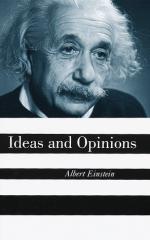
|
| Name: _________________________ | Period: ___________________ |
This test consists of 15 multiple choice questions and 5 short answer questions.
Multiple Choice Questions
1. How does Einstein characterize the first ten years of the Jewish presence in Palestine?
(a) As grueling and discouraging.
(b) As exceeding all expectations.
(c) As a dismal failure.
(d) As about what expected.
2. What correspondence does Einstein present in this part?
(a) Between him and Prussian and Bavarian academies of science .
(b) Between him and his wife.
(c) Between him and his mentor.
(d) Between him and the president of the United States.
3. Why should Judaism not be called a religion?
(a) Because faith is counter to its precepts.
(b) Because it demands no "faith"; just the sanctification of life.
(c) Because it acknowledges all paths lead to God.
(d) Because it is a way of life.
4. What new physical reality does Faraday introduce?
(a) The field.
(b) The 5th dimension.
(c) The rotuse.
(d) The reality of spirit.
5. What does Inertia cause?
(a) Circulation to be greatest just beyond the place of greatest curvature.
(b) A slow-down in electron movement the closer one is to the gravitation pull of the sun.
(c) Lassitude.
(d) A tendency to move faster once propeled.
6. What do the academies demand of Einstein?
(a) That he gives them reserach he conducted for them.
(b) That he says something good about the German people to the rest of the world.
(c) That he forfeits his pay and retirement.
(d) That he not work for any other country.
7. What do Faraday/Maxwell show exist in "free space"?
(a) Quarks and waves.
(b) Nothing.
(c) Fields and quarks.
(d) Waves and fields.
8. What prevents Jews from giving blind obeisance to any moral authority?
(a) A strong critical spirit.
(b) The education of their people.
(c) The commands of the Torah.
(d) The value Jews place on individualism.
9. For what does Einstein admire Kepler?
(a) For standing by his ideas despite the inquisition.
(b) For working out the planetary motions with no one's support and the understanding of few.
(c) For workinhg out the laws of gravity.
(d) For knowing when to look deeper into his theories.
10. What is the result of the accusations by these scientific communities?
(a) Einstein forces the resignation of several key members.
(b) Einstein resigns.
(c) Nothing.
(d) Einstein is expelled.
11. What essay opens Part 4?
(a) "Manifesto of the Chosen."
(b) "Mainifesto to Peace, March, 1943."
(c) "Manifesto--March, 1939."
(d) "Peace at What Cost, March, 1941."
12. What is a second requirement for Einstein for living in a country?
(a) The pursuit of happiness ideal.
(b) Intolerance for others who do not adhere to Jewish ideals.
(c) Tolerance.
(d) Justice for those who are oppressed.
13. Upon what is the special theory of relativity based?
(a) The constant of the speed of light.
(b) The relative positions of space.
(c) The way light moves through matter.
(d) The way light moves in space.
14. With what is Judaism concerned?
(a) Moral attitudes.
(b) The proper worship of God.
(c) The hope of the afterlife.
(d) The return of Jews to their homeland.
15. Why does Einstein think the protest will do better without his participation?
(a) The Germans will not be hostile towards Einstein as a result.
(b) It will have a greater air of impartiality.
(c) It will be attended by more people.
(d) The Germans will not think he incited them.
Short Answer Questions
1. At the time Einstein writes "Why Do They Hate the Jews?" what percentage of the world population is Jewish?
2. What guards Jews from social and psychological problems?
3. Neither intelligence nor institutions can substitute for what?
4. With what is this section primarily concerned?
5. What do friends and foes alike say the Jews represent?
|
This section contains 633 words (approx. 3 pages at 300 words per page) |

|




